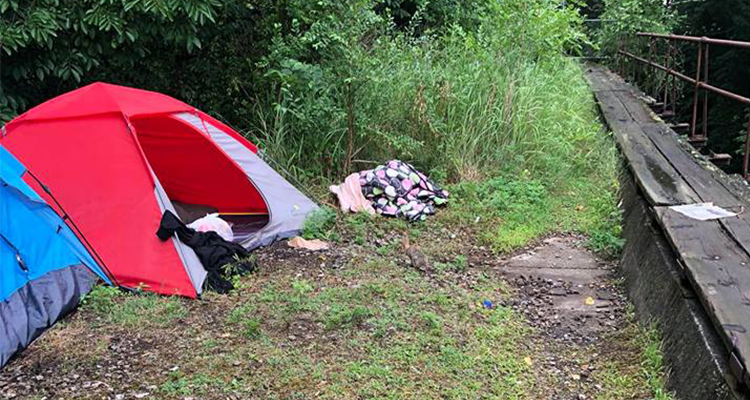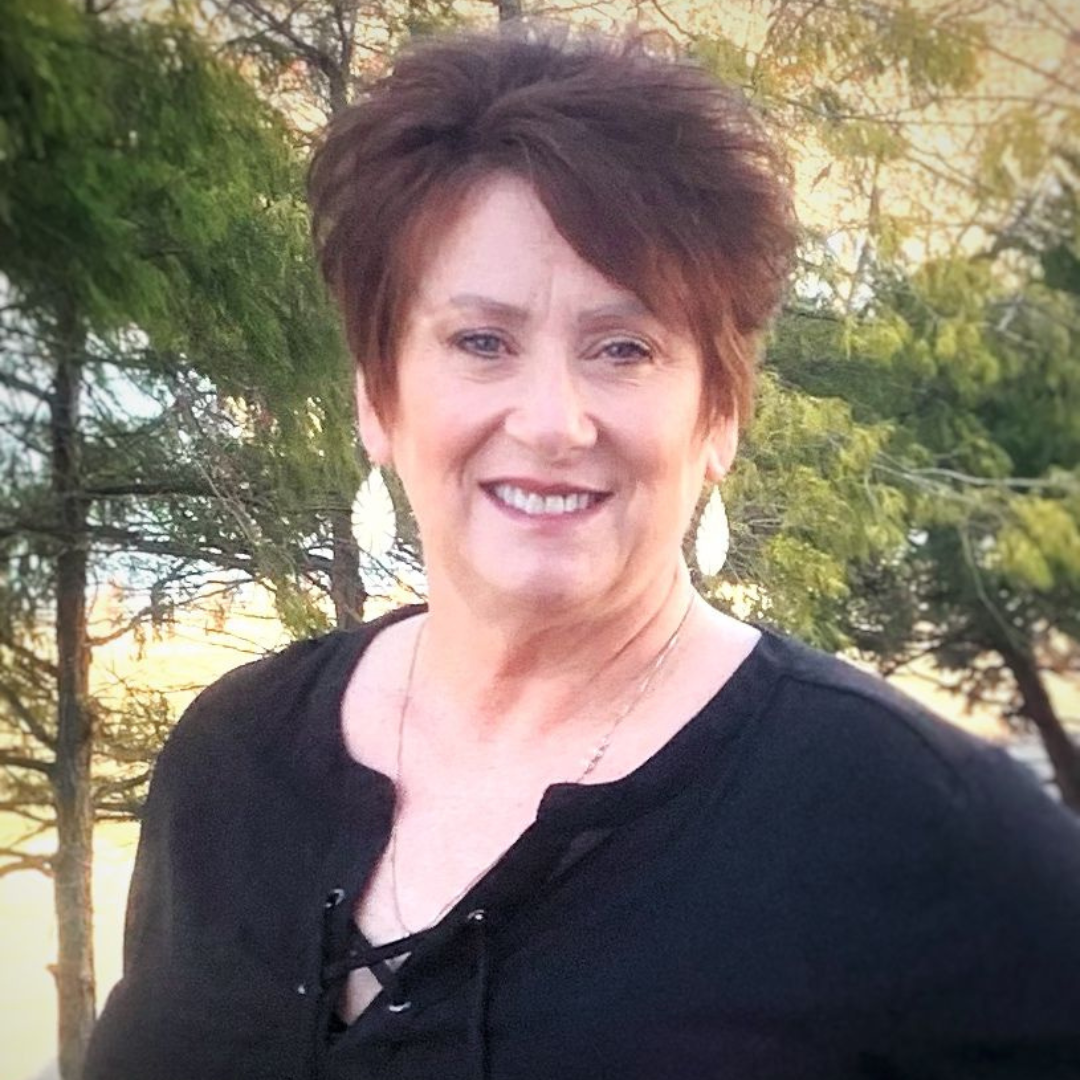Imagine that you’ve just had your leg amputated. It’s an emotionally devastating and life-altering event that will change the way you go about your daily routine. Staying mobile, performing simple self-care and grooming, undertaking the most mundane task — every aspect of your life will be affected by the loss of your limb. You will need to learn new ways of executing your everyday habits. There will be numerous follow-up appointments as well as the need for medications and bandage changes.
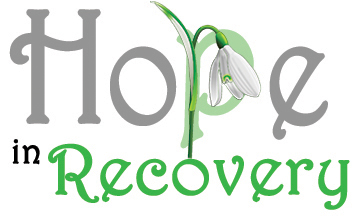 Now imagine that in addition to recovering from this major surgery and adjusting to your new circumstances, you’re also homeless. You have nowhere to go when released from the hospital. There is no one to help you as you recover. That is the grim reality for one patient of Project HOPE, Wheeling’s street medicine team.
Now imagine that in addition to recovering from this major surgery and adjusting to your new circumstances, you’re also homeless. You have nowhere to go when released from the hospital. There is no one to help you as you recover. That is the grim reality for one patient of Project HOPE, Wheeling’s street medicine team.
Project HOPE (Homeless Outreach Partnership Effort) is the Wheeling-Ohio County Health Department’s collaboration of medical and health care professionals who serve together on the streets and in the homeless shelters of Wheeling. The Project HOPE team helps to ensure equal access to medical care for unsheltered men, women and children in our community, bridging the gap between the homeless and the health care system by bringing “street medicine” directly to those who need it. Their goal is to create relationships by providing medical care with compassion, respect and dignity.
TAKING IT TO THE STREETS
In the early 1990s, Dr. Jim Withers began working with the homeless population in Pittsburgh and co-founded Operation Safety Net, a health care initiative for the unsheltered population he continues to serve there.
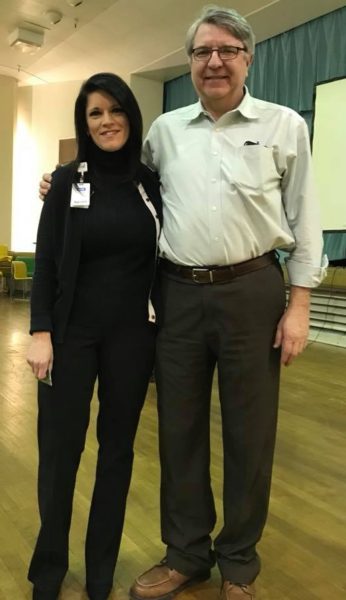
He coined the term “street medicine” to describe the growing global movement among health care workers such as himself to bring health care directly to people living on the streets. Dr. William Mercer, health officer of the Wheeling-Ohio County Health Department, felt called to become involved in street medicine after attending a medical conference in Boston, Mass., where he was invited to go on “‘street rounds” with Dr. Jim O’Connell, another pioneer in the field of street medicine
“I was immediately hooked,” Dr. Mercer says of this initial experience. He was further inspired by Dr. Withers’ program in Pittsburgh and decided to bring a similar effort to the local area, and thus, Project HOPE was born. The group is led by Dr. Mercer and Crystal Bauer, RN, who is the program’s director.
Crystal became involved in street medicine in a more roundabout way after working with Youth Services System’s Winter Freeze Shelter. Once the residents of the shelter learned that she was a nurse, they began asking her questions about their medical conditions. She recognized this as a gap in the local medical system and wanted to do something to fill it. That’s when John Moses, executive director of Youth Services System, introduced her to Dr. Mercer, knowing that he shared her concern for those living on the streets of Wheeling. The doctor and the nurse bonded over their common passion, and the rest is history.
Now, Project HOPE is a true team effort. “It takes a village to do this work,” Crystal emphasizes. Along with Crystal and Dr. Mercer, the core care team also includes Dr. Tom Wack and many volunteers. The group collaborates with community partners such as the Soup Kitchen of Greater Wheeling, Catholic Charities West Virginia, Northwood Health Systems, Salvation Army, House of Hagar, Youth Services System, Wheeling Hospital Family Medicine Residency, Greater Wheeling Coalition for the Homeless, Wheeling Health Right and local law enforcement. According to Dr. Mercer, Wheeling and San Francisco, Calif., are the only two street medicine teams in the United States that operate under the auspices of a local health department. Being affiliated with Wheeling’s Health Department is a plus, he says, as it gives Project HOPE access to more resources than the group may have otherwise.
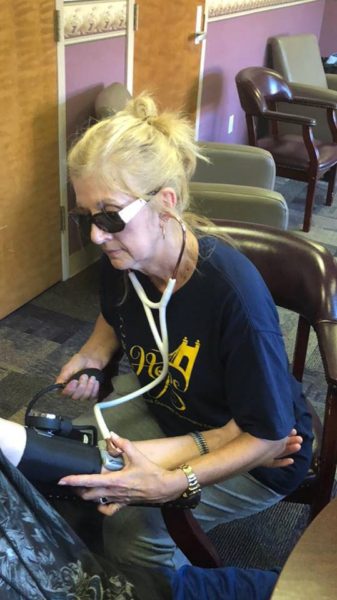
This year, Project HOPE was invited to present at the prestigious Street Medicine Institute’s International Street Medicine Symposium XIV in the Netherlands, taking place right now, Oct. 3-6. The symposium is the world’s premier educational event dedicated to the health care of unsheltered populations and features presentations from street medicine experts from around the globe.
This week, Project HOPE is presenting at the prestigious Street Medicine Institute’s International Street Medicine Symposium XIV in the Netherlands. The symposium is the world’s premier educational event dedicated to the health care of unsheltered populations and features presentations from street medicine experts from around the globe.
SMALL BUT MIGHTY
Nurse Crystal has become a formidable and vocal advocate for the homeless. She is a “go-to” contact person when an issue arises with a member of Wheeling’s homeless community. Crystal shares her personal cell phone number with many of her patients, and they aren’t hesitant to use it to call or text when they are in need. Recently, one of her female patients sent a text and asked Crystal to call 911 on her behalf, as she was in the midst of a violent domestic situation and couldn’t make the call herself.
“You get attached to these folks and want to help,” says Crystal. She is a small woman with a big personality and the heart to match. Her passion for her patients is evident, and she has the necessary grit to be their voice when they’re unable to speak for themselves. Crystal’s efforts have been recognized by the community this year, as she is one of this year’s honorees for the YWCA’s “Tribute to Women” awards.
STREET ROUNDS
On a sweltering late-summer evening, Project HOPE allowed Weelunk to tag along on street rounds. You may realize that the homeless dwell among us, but it’s hard to fathom just how many people are literally living just out of sight all around you. We encountered two dozen or more during the evening, many of whom wanted to discuss their health concerns with the medical team, which consisted of Dr. Mercer, Crystal, another nurse named Maryanne and Lance, a medical student.
“Knock, knock … anyone home? Project HOPE!” Dr. Mercer would call out as we approached an encampment. The team was greeted warmly in each instance, almost like long-lost family members in some cases. It’s clear that Wheeling’s homeless population both likes and respects the Project HOPE teams. Crystal recently changed her hairstyle, and someone commented about it at nearly every stop. “Crystal, you changed your hair!” one man called out to her. “Do I look younger?” she responded. “You didn’t look old before!” he replied, laughing. The atmosphere was more that of a family reunion than a medical “house” call. Crystal explained that gaining the patients’ trust and establishing a good rapport with them was the foundation of their mission.
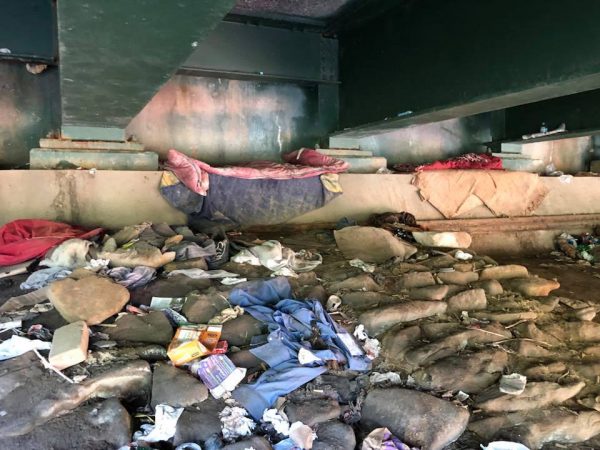
The people we met were incredibly grateful for the care they were receiving. Most of the patients thanked Crystal and Dr. Mercer for their help. In addition to medical care and advice, the team handed out cold bottled water, bagged lunches and freshly-baked snickerdoodle cookies. The water is donated by Kroger, and the lunches are packed and provided by the Soup Kitchen. A patient of Dr. Mercer’s graciously bakes homemade cookies for the cause. Along with the food, the team distributed condoms and made one-for-one needle exchanges.
“There are mixed views about the needle exchange program,” Crystal said. “But treating one person for hepatitis costs around $100,000. So this is an inexpensive way to help prevent those costs.” Patients were painfully honest with Crystal, Maryanne and Dr. Mercer about their drug habits. One young man didn’t seem to understand the connection between his heroin addiction and the frequent dizzy spells and episodes of shortness of breath he was experiencing.
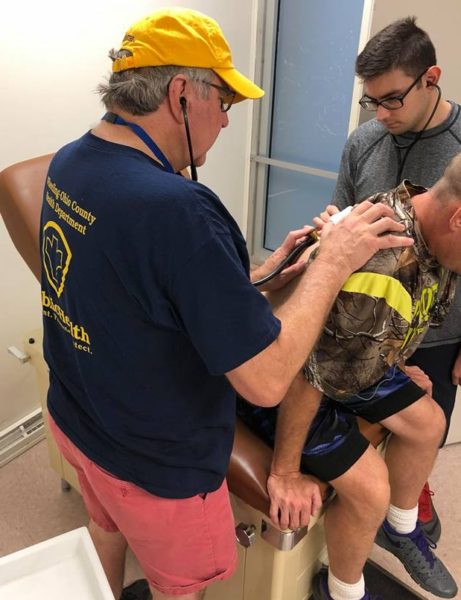
The team examined and assessed foot wounds, painful backs, congested lungs, a bruised hand and one severe case of psoriasis. Other common conditions they treat include infected wounds, broken bones and complications of diabetes, often right in the encampments. When conditions require a more clinical atmosphere, the team has several well-equipped exam rooms located inside various local agencies. During these rounds, they attended to patients in their private exam rooms at Northwood and the Salvation Army. If time or other constraints made on-the-spot treatment impossible, Crystal and Dr. Mercer were quick to make phone calls or send text messages to make alternate arrangements with other providers such as Wheeling Health Right. “We are very fortunate to have great relationships with so many other groups and agencies,” Dr. Mercer said.
MERCER, PUBLIC HEALTH PRACTIONER
Dr. Mercer has a passion for public health issues, particularly street medicine. Where the homeless are concerned, “we have to meet them where they are,” he says. He and the team sometimes become frustrated when their efforts aren’t always welcomed or successful.
Dr. Mercer shared the story of Charlie.* (His name is changed to protect his privacy.) The team was able to secure housing for Charlie and was thrilled to offer him the chance to move indoors from his camp high in the steel beams of a local bridge. However, as moving day approached, Charlie decided he was happier living outside. The team was disappointed. “But we had to accept his choice,” Dr. Mercer stated with conviction.
Practicing public health medicine can be difficult, and many organizations like Project HOPE are dependent upon donations for their programs. Dr. Mercer says the best way the public can help the homeless population is to direct any contributions to the homeless agency of their choice instead of handing cash to someone standing at an intersection. Although street medicine can be fraught with frustrations, there are also ample rewards. Securing housing for a hard-to-place patient, helping someone get into a rehab facility or being able to immediately address an urgent health concern can be life-changing for the patient. Small victories such as these are also extremely rewarding for the team and fuel their love of this work.

“NO ONE EVER ASPIRED TO BE HOMELESS WHEN THEY GREW UP.”
According to Crystal, the general public often fails to recognize unsheltered citizens as worthwhile fellow human beings. Crystal said that Project HOPE sometimes does an exercise with their patients in which they ask them to disclose personal tidbits about themselves in an effort to distinguish them as unique individuals. One question asked is, ‘When you were young, what did you want to be when you grew up?’ The answers were remarkably routine — teacher, police officer, firefighter. “No one ever aspired to be homeless when they grew up,” said Crystal. “Some of our patients are gifted artists or musicians. Some had impressive careers; some have multiple college degrees.” Choices and circumstances often collide in such a way that people find themselves on the street. “But if you strip away all of our belongings, we are all exactly the same underneath,” Crystal said.
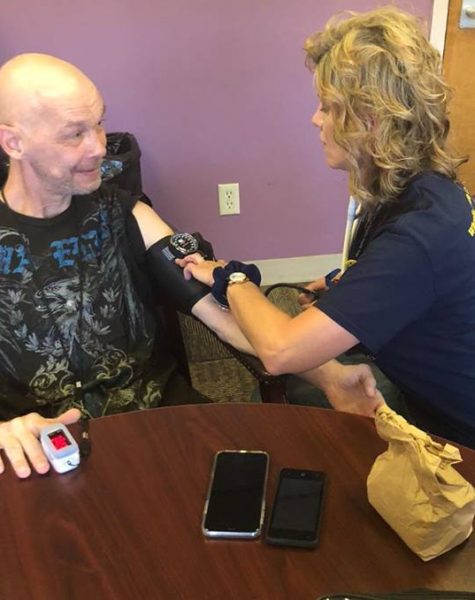
KENNY’S STORY
Kenny is a 52-year-old formerly homeless man that Project HOPE and the Greater Wheeling Coalition for the Homeless have helped to find permanent housing. Prior to his lung cancer diagnosis last year, his love of vintage muscle cars led him to work as a mechanic. The team made a house call during street rounds to check on him, as he had called Crystal the night before and told her he was feeling ill. Kenny underwent surgery last year to remove his left lung. Sadly, the cancer has now metastasized to his brain, and he suffers from neurological issues and seizures. Because of this, he no longer receives radiation treatment.
And so the team waits with him for the next phase of his journey. Crystal is visibly emotional as she relates his story. “We’ve now lost seven of our long-time patients,” she tells me. “The average age at the time of their death was 53. We have a plan in place for Kenny to ensure he does not leave this world alone.”
Kenny is a sweet, likable man who seemed genuinely happy to see Crystal and the rest of the team. Last week, Crystal had lunch with him, mostly to keep tabs on his condition. His relationship with the team illustrates just how close the providers become to their patients. “You definitely get attached,” Crystal told me.
SILVER LININGS
In the course of making street rounds, I heard Crystal tell a number of patients, “There’s always a silver lining!” Her enthusiasm is contagious and seems to light the tiniest spark of motivation in some of those we saw. Project HOPE is the “silver lining” of the homeless situation in Wheeling. The group is fostering relationships, providing care and advocating for the betterment of this marginalized population. Dr. Mercer wraps up each exam by handing his patient a roll of Lifesavers candy — and there couldn’t be a more perfect symbol of the work done by Project HOPE. Their brand of compassionate street medicine is saving lives each and every day.
WAYS TO HELP PROJECT HOPE
For more information about Project HOPE or to make a monetary donation, visit their Facebook page at www.facebook.com/projecthopewheeling. Along with financial contributions, the team is always looking for new or gently used tents to help their patients weather the elements.
(Photos provided by Project HOPE)
• A lifelong Wheeling resident, Ellen Brafford McCroskey is a proud graduate of Wheeling Park High School and the former Wheeling Jesuit College. By day, she works for an international law firm; by night, (and often on her lunch breaks and weekends) she enjoys moonlighting as a part-time writer. Please note that the views expressed in her writing are solely her own and do not necessarily reflect those of anyone else, including her full-time employer. Through her writing, Ellen aims to enlighten others on causes close to her heart, particularly addiction, recovery and equal rights. She and her husband Doug reside in Warwood with their clowder of rescued cats, each of whom is a direct consequence of his job as the Ohio County Dog Warden. Their family includes four adult children, their spouses and several grandkids.


